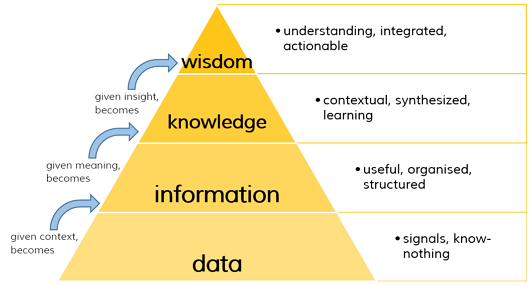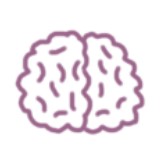Relationship between Data, Information, Knowledge & Intelligence .
Everything in the universe has relation with each other how to things and concept relate each then make a strength of success
Data is defined as numerical or other facts represented or recorded in a form suitable for processing by computers. Data is often the record or result of a transaction or an operation that involves modification of the contents of a database or insertion of rows in tables. Information in its simplest form is processed data that is meaningful. By processing, summarizing or analyzing data, organizations create information. For example the current balance, items sold, money made etc. This information should be designed to increase the knowledge of the individual, therefore, ultimately being tailored to the needs of the recipient. Information is processed data so that it becomes useful and provides answers to questions such as "who", "what", "where", and "when". Knowledge, on the other hand is an application of information and data, and gives an insight by answering the “how” questions. Knowledge is also the understanding gained through experience or study. Intelligence is appreciation of "why", and finally wisdom (not shown in the figure-1.1) is the application of intelligence and experience toward the attainment of common goals, and wise people are powerful. Remember knowledge is power. .png)

Has Anyone Seen My CDs?
A few years ago, the UK Government Tax office lost some CDs containing 25 million people’s records, when they were posted unsecurely. The fear was that there was enough information contained on them to allow criminals to set up bank accounts, get loans, and do their Christmas shopping… all under someone else’s name.
In the fallout, the main argument in the press was about security, and inevitably there were many that were using it to attack Government ministers. Anyone who’s ever worked in a bureaucracy will know that this kind of thing goes on more often that we would like to think, as people cut corners. No procedure or official process is water-tight. It’s just this time, they didn’t get away with it.
The media used the terms “data” and “information” interchangeably.
For example, one of the frequent mistakes was that they lost “data.” However, you can’t physically lose data. You can’t physically pick up data, move it about, etc.
Confused?
Let me explain, but – before we go any further – I should point out that I’m using the Infogineering defintions of the three words (data, information, knowledge) here. They’ve been so muddled up over the past few years that the various definitions don’t match up. So, let me explain how  views them all.
views them all.
Knowledge
Firstly, let’s look at Knowledge. Knowledge is what we know. Think of this as the map of the World we build inside our brains. Like a physical map, it helps us know where things are – but it contains more than that. It also contains our beliefs and expectations. “If I do this, I will probably get that.” Crucially, the brain links all these things together into a giant network of ideas, memories, predictions, beliefs, etc.
It is from this “map” that we base our decisions, not the real world itself. Our brains constantly update this map from the signals coming through our eyes, ears, nose, mouth and skin.
You can’t currently store knowledge in anything other than a brain, because a brain connects it all together. Everything is inter-connected in the brain. Computers are not artificial brains. They don’t understand what they are processing, and can’t make independent decisions based upon what you tell them.
There are two sources that the brain uses to build this knowledge – information and data.